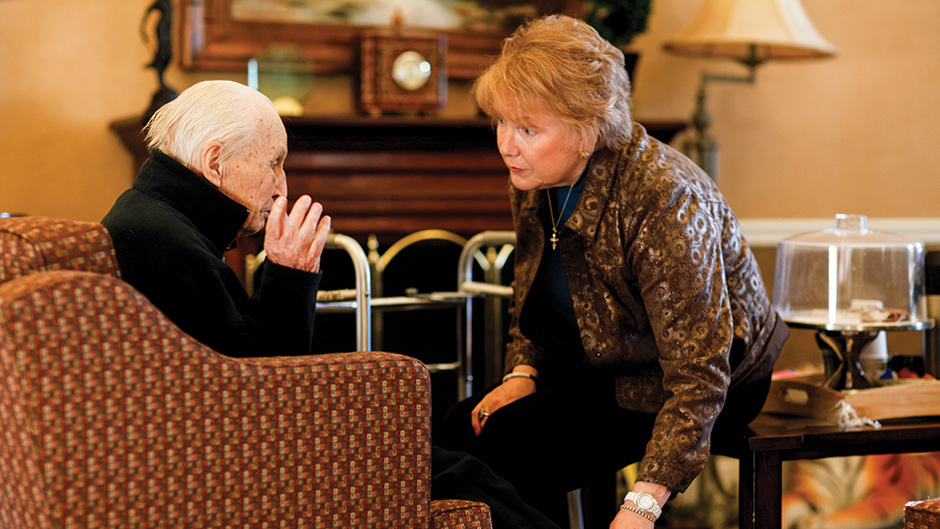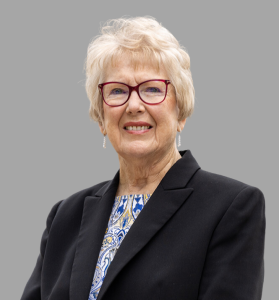From staffing shortages to underpaid staff and a lack of personalized care, issues that have plagued nursing homes for decades in the United States were exposed during the COVID-19 pandemic.
April 18, 2022
Original story published by Show Me Mizzou.
April 18, 2022
Contact: Brian Consiglio, 573-882-9144, consigliob@missouri.edu

In response, the National Academies of Sciences, Engineering and Medicine organized a team of 17 national nursing home experts, including MU’s Marilyn Rantz, a Curators’ professor emerita at the MU Sinclair School of Nursing. The panel, which first met in fall 2020, recently released a national report providing recommendations to the U.S. Congress for improving the quality of care in nursing homes throughout the country.
The report highlighted seven key priorities:
- Deliver person-centered, equitable care that promotes autonomy and manages risks.
- Ensure a well-prepared and appropriately compensated workforce.
- Increase transparency and accountability of finances and operations.
- Create a more robust financing system.
- Design a more effective system of quality assurance.
- Expand and enhance quality measurement and quality improvement.
- Adopt health information technology in all nursing homes.
“The COVID-19 pandemic lifted the veil and exposed some of the problems that have existed even before the pandemic,” Rantz said. “As an independent group of experts in this field, our goal is to use evidence-based research solutions to solve complex problems and advise Congress on potential actions that will ultimately improve the quality of care in nursing homes.”
A nurse for more than 52 years and one of MU’s most successful and productive researchers, Rantz has earned more than $100 million in total grants and authored or co-authored more than 200 research studies throughout her career at MU. She has dedicated her career to improving the quality of care in nursing homes.
“One of the most practical things we can implement in nursing homes immediately is incorporating the preferences of the residents themselves into care plans,” Rantz said. “Some simple examples might be ensuring a resident has clean pajamas each night before going to bed, a cup of coffee each morning or a square of chocolate in the afternoon to brighten their mood. It can also be providing socialization opportunities, such as bingo night or music groups, or even time to walk outside every day to get fresh air.”
Rantz said some evidence-based recommendations that nursing homes should implement immediately also include staffing at least one registered nurse in each nursing home 24 hours a day, seven days a week, and hiring both a full-time social worker and an infection prevention and control specialist per nursing home. Another top priority is increasing wages and benefits for staff.
“Other goals going forward include the enhancement and enforcement of minimum staffing standards, increasing the transparency of finances to ensure money is being used appropriately, and ensuring state agencies have adequate resources. In addition, we hope to eventually plan toward the establishment of a federal, long-term care benefit that would expand access and advance equity to all adults who need long-term care, regardless of their ability to pay,” Rantz said. “Nursing homes were particularly affected by the pandemic, and when you look closer within the nursing homes, people of color were disproportionately affected.”
An expert in chronic illness management, leadership and quality improvement, Rantz began her career as a nurse in 1970 before becoming a nursing home administrator in Wisconsin, where she led a staff of more than 400 people, overseeing a 300-bed nursing home.
“What makes an effective leader is someone who is caring, someone who values their staff, listens to them and encourages them as someone who has been in their shoes,” Rantz said. “If a nursing home is dealing with constant staff turnover, there might be something wrong with the way systems are set up, and correcting those issues can help boost morale and overall care delivery.”
To help address the country’s nursing shortage, the MU Sinclair School of Nursing’s new 64,585 square-foot facility, expected to be completed on MU’s campus by fall 2022, will allow the school to increase class sizes and graduate more nurses.
“Creating new knowledge through research and educating young people are what the university is all about,” Rantz said. “I am proud of our nursing students, who often go on to work in underserved communities with high demand for educated nurses.”
During her time at MU, Rantz helped lead the Missouri Quality Improvement Initiative. This program, funded by Centers for Medicare and Medicaid (CMS), implemented advanced practice registered nurses full time into Missouri nursing homes, which helped nursing home staff identify illnesses earlier and reduce avoidable hospitalizations. In 1999, she also developed the Quality Improvement Program for Missouri (QIPMO), a program that provides free clinical consultation of best practices and infection prevention to all Missouri nursing homes and assisted living facilities. Rantz still leads the program today, and the program is a national model for other states to improve quality of care in nursing homes.
“I have been passionate about getting evidence-based practices infused into nursing homes, and hopefully programs like this can serve as a model that other states can adopt,” Rantz said. “As a national panel, our overall objective is to improve the way our country finances, delivers and regulates care in nursing homes.”
